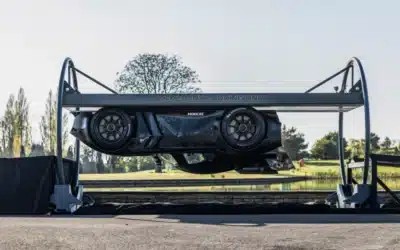
The impending summer months are set to bring the inevitable searing heat with peak temperatures of nearly 50°C during the day and barely dipping below 30°C at night. The intense roast, and indeed humidity in port cities like Dubai and Jeddah, means that air-conditioned cars offer a much-needed and welcome respite when out and about.
Can we rely on our EVs when the mercury rises and the air sizzles? Key concerns that would-be owners might have, include the effects of extreme temperature on driving range and battery life.
In fact, all vehicles experience reduced efficiency in hot weather. For example, hotter air is less dense, which means it contains less oxygen for combustion in a conventional petrol engine. This reduces power and efficiency, particularly in turbocharged and supercharged engines. Additionally, fuel can vaporize more quickly in the fuel line which also adversely affects engine performance. Plus of course, the engine could overheat, put further at risk by engine oil’s tendency to thin at higher temperatures, reducing its effectiveness as a lubricant.
How Heat Impacts EVs
Nonetheless, there can also be a pronounced impact on the performance of electric cars due to their reliance on battery performance. One study in America demonstrated that even at just 35°C the overall range could be compromised by 17%. This is largely due to the increased energy demands of air conditioning systems as well as the impact on battery operation in less-than-optimal temperatures. EV batteries generally perform best at around 20°C.
Concern is also often expressed about the risk of a battery overheating, leading to thermal runaway and potentially a fire. However, this is exceptionally rare and only likely if the battery has suffered some kind of prior damage. Most modern EVs feature thermal management and cooling systems that maintain optimum battery temperature.

Using seat cooling occasionally instead of the air conditioning can help reduce power usage.
Hot Weather Tips for EV Drivers
1. Pre-Cool Your Car
You can set up ‘pre-conditioning’ for most new EVs through a connected app. Set it to cool your car (especially if it’s connected to your home charger at the time) before you set off on your journey, to reduce load on the battery while driving. Obviously, whenever possible, try to park the car under cover of shade.
2. Cooler Charging
The process of charging can also cause batteries to overheat, but most EVs have built-in systems that monitor the temperature. If they detect the temperature rising, the system will automatically slow down the rate at which the car is charging. This also helps preserve battery life.
EVs feature a Battery Management System (BMS) to help in regulating the battery. Occasionally software updates might be released for the BMS; try to ensure these are kept updated.
If possible, charge during the cooler parts of the day such as early morning or during the night, and set your charge limit to 80% instead of a full charge to reduce battery strain. The good news is that you can use the air conditioning while charging without affecting the battery or the charging process. Also use the ‘cooled seats’ feature, where fitted, to reduce reliance on the aircon solely.
3. Look After Your EV
As ever with any motor vehicle, proper and diligent maintenance ensures peak performance.
Adhere to manufacturer servicing schedules and don’t be shy about taking it back in if you’re concerned about the cooling systems. It is important to ensure that the battery coolant systems are working properly, but these are mostly sealed units and you won’t be able to check them yourself.
Just as in a conventional fuel car, employ more efficient driving techniques to reduce stress on the car, and conserve driving range. So, avoid hard acceleration, sustained high speed and harsh braking. Use one-pedal mode (where available) and rely more on regenerative braking, plus use cruise control to maintain steady and optimal speeds on the motorway.
Finally, check the tyres. Heat can affect tyre pressures and improperly inflated tyres would increase rolling resistance and reduce range.
We would love to get some feedback!
Let us know if you found this article useful or if you have comments or outstanding questions.











